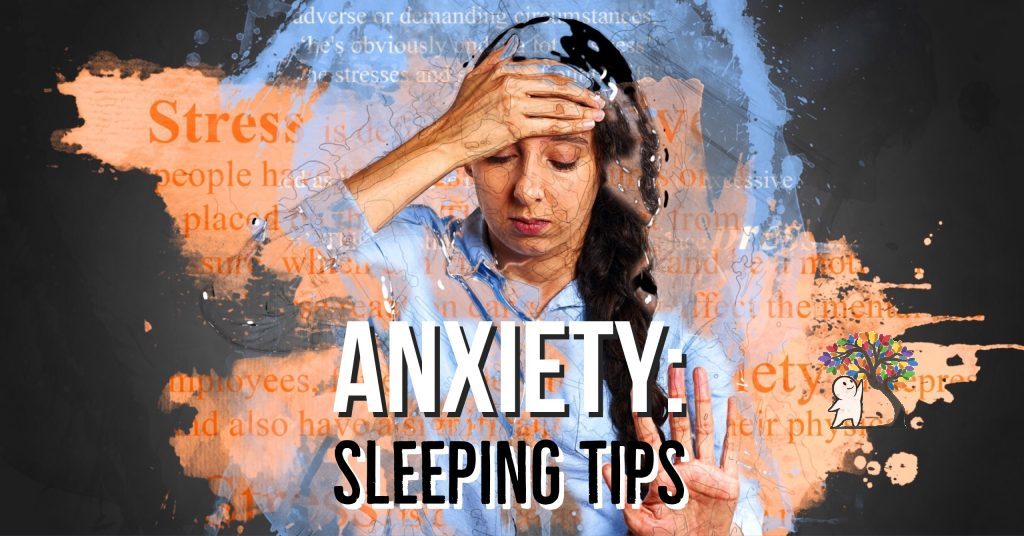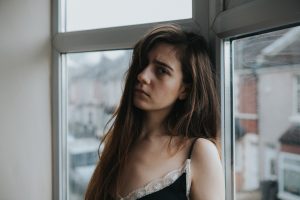11 Sleeping Tips for People with Anxiety

When you have anxiety many things become more difficult, one of these things is usually sleeping. These tips are aimed specifically at those with anxiety, to help with sleeping. Not everyone with anxiety experiences sleeping problems but even those without anxiety can use solid sleeping advice. Some are focused on staying relaxed in your mind, as well as in your body. Some are focused around food advise.
1. Keep caffeine low in the run up to bedtime.
If you already suffer from sleeping problems and insomnia as a result of anxiety, it can be tempting to drink caffeinated drinks such as coffee to stay as awake was possible during the day. However, caffeine can stay in your system for up to 8 hours after consumption. You should try to keep caffeine intake down from about 6 hours before you plan on going to sleep. Caffeine can also increase feelings of anxiety. (source) (Hughes,1996)

2. Drink Warm (Soy)milk.
You can add some honey or a little bit of cocoa to add extra taste. Both contain tryptophan, which is an essential aminoacid needed to produce serotonin. (source) Good serotonin levels are essential in combating depression and anxiety.
3. One of our top anxiety sleeping tips: try a mindful body scan.
https://giphy.com/gifs/U5dPt0qZ7F1ks
A mindful bodyscan will help you relax your muscles and your mind. It’s best to do it lying down on your back, but it can also be done sitting up in bed. You can find one on youtube here. Note that when your anxious this can take some practise, so don’t give up after the first try! (Miller & Fletcher, 1995)
“Wow! I’ll admit, I’m usually quite skeptical of this type of stuff, but I finally tried it. It made me feel very relaxed, calm, and focused. I forgot all my worries! It was almost like a dream.” – Luke R
You might also like this quiz: “What is your mental age?”
4. No napping during the day.
Even if you feel tired and drained as a result of anxiety and loss of sleep, keep daytime napping to a minimum. Otherwise you’ll system will be confused about when it’s time to sleep, which can make your sleep less effective. It will also make sure you really want to sleep at the end of the day. This can help getting to sleep faster.
5. Make sure your environment is good, and as trigger free as possible.

This means as little sounds as possible. Even if you don’t wake up from them, noises in your surroundings influence sleep quality negatively (Li & Wang et al. 2011). This also means a dark enough room. A too light room, or a room that get’s light earlier than you wanted to wake up, will also decrease sleep quality. (source) You can also wear a sleep mask if that comfortable. This is one of the most essential sleeping tips. Trigger free means that things that can trigger anxiety should be out of sight or covered with a cloth, for example. Does schoolwork trigger intense anxiety, cover your books or turn them facing away from you.
6. Keep late night or midnight snacks to a minimum.

Large meals will keep you more active, and therefore less sleepy. Try not to eat too much after dinner, as it might affect your ability to get to sleep. (source)
You might also like: 9 Facts About Serotonin – Can This Substance be a Cause of Depression?
7. Create a going to bed ritual for classical conditioning.

Like Ivan Pavlov did, this will condition your brain into getting into sleep-mode when doing these activities. Do things that are relaxing, perhaps some self care from our self-care tips article. Maybe even incorporate scent to condition your brain into getting ready to enter sleep mode when it’s present. (source Cleveland Sleep Clinic) A good one could be Lush’s “Sleepy” lotion, with soothing lavender and tonka. (this is not sponsored)

8. If you wake up as a result of your anxiety, try to keep lights to a minimum.
As explained previously, this will start to wake up your brain. If you really need light, use a flashlight or your phone. Try not to turn on a big light. This will make it easier for you to get back to sleep. (source)
9. Experiment with different soothing scents and textures.
As explained in some sleeping tips above, finding peace and comfort before bed is important. Your sleep quality will hopefully improve. Make sure you have some comforting soft things, such as a nice pair of pyamas. Even a pair of extra comfy socks or a soft textured pillow will be able to help. Spray them with a scent that’s relaxing for you, such as chamomile or lavender, to create a gently scented relaxing environment. Do not make the scents to strong of course, otherwise it might distract.
10. When you have to wake up, get into natural light and open a window.
https://giphy.com/gifs/dreaming-cat-HhRGUdBJ5RVT2
This is part of the sleeping tips anxiety routine. When you’ve trained your brain into getting into sleep mode at the right moment, it’s important to also condition it into leaving sleep mode when needed. Use natural light and fresh air to wake up. Try to stick to certain times to wake up and go to sleep. This will increase sleeping quality. (National Sleep Foundation)
11. If you get anxiety about time, put your clock where you can’t see it directly.
When you are lying awake feeling your anxiety at it’s peak, watching the hours tick by will take away focus from getting back to sleep. That, and it’s also not a pleasant sensation as it makes you conscious of the amount of sleep you are not getting. Put your clock where you can see it if needed, but not where you can see it directly when you wake up. Perhaps put it on your nightstand but make it face away from you. This will prevent you from focusing too much on the time before your alarm goes off in the morning. It also helps you get to sleep more easily if your anxiety wakes you up in the middle of the night.
So these were 11 sleeping tips for people with anxiety, do you have anymore? Let us know in the comments. Visit our Patreon for awesome Psych perks!
READ MORE:
Psychological Secrets to Better Sleeping
10 Harry Potter Psychology Lessons
6 Suprising Effects of Narcissistic Parenting
Which Temperament Are You: 4 Temperaments Quiz
Several Sources
Hughes, R. N. (1996). Drugs which induce anxiety: Caffeine. New Zealand Journal of Psychology, 25, 36-42.
Li, S. Y., Wang, T. J., Vivienne Wu, S. F., Liang, S. Y., & Tung, H. H. (2011). Efficacy of controlling night‐time noise and activities to improve patients’ sleep quality in a surgical intensive care unit. Journal of clinical nursing, 20(3‐4), 396-407.
Miller, J. J., Fletcher, K., & Kabat-Zinn, J. (1995). Three-year follow-up and clinical implications of a mindfulness meditation-based stress reduction intervention in the treatment of anxiety disorders. General hospital psychiatry, 17(3), 192-200.




Awesome!
I like tip no 11 will try to keep my clock away from my eyes. Hope it will reduce my stress.